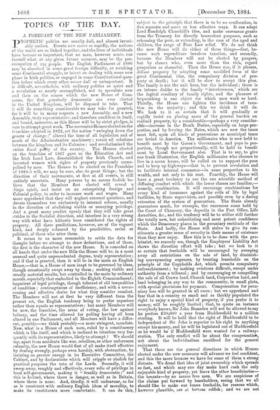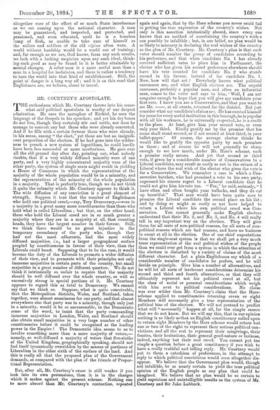TOPICS OF THE DAY.
A FORECAST OF THE NEW PARLIAMENT.
pROPHETIC politics are usually dull, and almost invari- ably useless. Events now move so rapidly, the nations of the world are so linked together, and the lives of individuals have become so important, that no man, however acute, can foretell what, at any given future moment, may be the pre- occupation of any people. The English Parliament of 1886 may be absofbed in some great foreign difficulty, or watching some Continental struggle, or intent on dealing with some new phase in Irish politics, or engaged in some Constitutional ques- tion before which every other seems dull or unimportant. It is difficult, nevertheless, with ordinary politics so quiet and a revolution so nearly accomplished, not to speculate now and then on the course which the new House of Com- mons, the first genuinely democratic one ever elected in the United Kingdom, will be disposed to take. That it will do something considerable we may take for granted, for it will be in many respects a new Assembly, and a new Assembly, truly representative, and therefore confident in itself, and bound, moreover, as this House will be by strict pledges, is sure to attempt great work. The successivellouses elected on the franchise adopted in 1832, sat the nation "swinging down the groove of change ;" altered the tone of all legislation and of much of the Administrative machinery ; recast all relations between the kingdom and its Colonies ; and revolutionised the entire fiscal pokty of the country. The Houses elected on the franchise of 1867 gave us the Education Act and the Irish Land Law, disestablished the Irish Church, and invested women with rights of property previously mono- polised by men. The Houses to be elected on the Franchise of 1884-5 will, we may be sure, also do great things ; but the direction of their movements, at first at all events, is still entirely uncertain. Many persons by no means foolish be- lieve that the Members first elected will reveal a Jingo spirit, and insist on an enterprising foreign and Colonial policy, in order to increase work and wages. Many more apprehend that they will neglect external questions, and devote themselves too exclusively to internal reform, usually in the direction of abolishing visible or annoying privilege. And a great many predict openly that they will take great strides in the Socialist direction, and interfere in a very strong way with what have hitherto been considered the rights of property. All these predictions, however, are of the vaguest kind, and deeply coloured by the proclivities, social or political, of those who utter them.
It seems to us more reasonable to settle the data for thought before we attempt to draw deductions, and of these, the first is the character of the new House. It is conceded on all hands that under the new Bills the House will be, in a most unusual and quite unprecedented degree, truly representative ; and if that is granted, then it will be in the main an English House,—that is, a House of men inapt to be governed by ideas, though occasionally swept away by them ; seeking visible and usually material results, but controlled in the main by ordinary morals, especially that embodied in the Eighth Commandment; impatient of legal privilege, though tolerant of old inequalities of condition ; contemptuous of inefficiency, and with a never- ceasing and effective desire for what they consider comfort. The Members will not at first be very different from the present set, the English tendency being to prefer superiors rather than equals as representatives ; but many Members will be new, the franchise, the areas of voting, the law against bribery, and the time allowed for polling having all been altered in one Parliament, and all Members will have a differ- ent, possibly—we think probably—a more stringent, mandate. Now, what is a House of such men, ruled by a constituency which is like itself, and which is inclined to interfere very fre- quently with its representatives, likely to attempt ? We should say, apart from accidents like war, rebellion, or other unforeseen calamity, the new House would first of all make itself effective by dealing strongly, perhaps even harshly, with obstruction, by insisting on greater energy in its Executive Committee, the Cabinet, and by declarations which will cripple or abolish for practical purposes the veto of the Lords. Secondly, it will sweep away, roughly and effectively, every relic of privilege in local self-government, making it "frankly democratic ;" and this in Ireland, where there is danger, as well as in Britain, where there is none. And, thirdly, it will endeavour, so far as is consistent with ordinary English ideas of morality, to make its constituents more comfortable. It can do this, subject to the principle that there is to be no confiscation, in five separate and more or less effective ways. It can adopt Lord Randolph Churchill's idea, and make enormous grants from the Treasury for directly benevolent purposes, such as rehousing the poor, or extending, in the case of the aged and children, the range of Poor Law relief. We do not think the new House will do either of these things—first, be- cause such expenditure involves taxation, and secondly, because the Members will not be elected by paupers, but by classes who, even more than the rich, regard pauperism as shameful. Then the House can, if it pleases, diffuse property by adopting some modified form of the great Continental idea, the compulsory division of pro- perty at death ; but it will be slow to accept this plan. The family is not the unit here, but the individual ; there is an intense dislike to the family "interferences," which are the logical corollary of family rights, and the pleasure of bequeathing is one object for which men work so hard. Thirdly, the House can lighten the incidence of taxa- tion on the majority ; and this we think it will do. We look to it as certain that it will gradually or rapidly insist on placing more of the general burden on realised property, by a considerable—perhaps a very consider- able—increase in the Death Duties, especially on large pro- perties, and by levying the Rates, which are now the taxes most felt, upon all kinds of possessions as municipal taxes are levied in America. The millionaire who is now held to benefit most by the Queen's Government, and pays in pro- portion, though not proportionally, will be held to benefit most by Local Government also. That is to say, to give one frank illustration, the English millionaire who chooses to live in a mean house, will be called on to support the poor and to keep up highways—that is, to prevent revolution and to facilitate internal commerce—in some proportion to his wealth, and not only to his rent. Fourthly, the House will have a great tendency to use the one scientific method of diffusing comfort with which the lower classes are familiar,— namely, combination. It will encourage combinations for every kind of insurance against the evils of life by legal facilities, by State supervision, and possibly even by a daring extension of the system of guarantees. The State already guarantees much, for example, the enormous sums held by the Court of Chancery, the deposits in the Post Office, Life Annuities, &c., and the tendency will be to utilize still further the totally new, but unhesitating and most potent confidence which the Democracy places in the pecuniary rectitude of the State. And lastly, the House will strive to give its con- stituents a greater sense of security in their means of existence than they now enjoy. How this is to be done with the pro- letariat, we scarcely see, though the Employers' Liability Act shows the direction effort will take ; but we look to it as certain that freeholds will be encouraged by sweeping away all restrictions on the sale of land, by diminish- ing conveyancing expenses, by treating leaseholds on the principle of the Copyholds Act, which permits compulsory enfranchisement ; by making evictions difficult, except under authority from a tribunal ; and by encouraging or compelling the sale of all Crown land, Church land, Corporation land, and land belonging in any way to the community, in small plots, with special provisions for payment. Compensation for pecu- niary loss will be granted in all cases ; but we apprehend and fear that in a country so small and so thickly populated the right to enjoy a special kind of property, if you prefer it to money, will be roughly limited ; that, to quote an instance everybody knows, Sir John Ramsden will not be allowed to say he prefers £30,000 a year from Huddersfield to a million sterling. It will be held that the right of Huddersfield to be independent of Sir John is superior to his right to anything except his money, and he will be legislated out of Huddersfield as he would be if Huddersfield were wanted for a railway- station. The only conflict will be about the compensation, not about the individualism sacrificed for the general enjoyment.
That these are the general directions in which Houses elected under the new measures will advance we feel confident, and this the more because we have for some of them a strong distaste. We dread that idea of joint ownership which spreads so fast, and which may one day make hard cash the only enjoyable kind of property, yet leave the other beneficiaries— the tenants—by no means free men. We are suspicious of the claims put forward by leaseholders, seeing that we all should like to make our leases freeholds, for reasons which, however plausible, are at bottom selfish; and we are not
altogether sure of the effect of so much State interference as we see coming upon the national character. A man may be guaranteed, and inspected, and protected, and pensioned, and even educated, until he is a boneless lump of flesh, as unable to take care of himself as the sailors and soldiers of the old re'ginte often were. A world without hardship would be a world out of training ; and, far enough as we are, God knows, from any such results, we look with a lurking suspicion upon any such ideal, think- ing such good as may be found in it is better attainable by mental changes. A sober man is a more useful man than a man in a hospital for inebriates, and there is rather a tendency to turn the world into that kind of establishment. Still, the point of danger is a long way off ; and it is on this road that Englishmen are, we believe, about to travel.







































 Previous page
Previous page